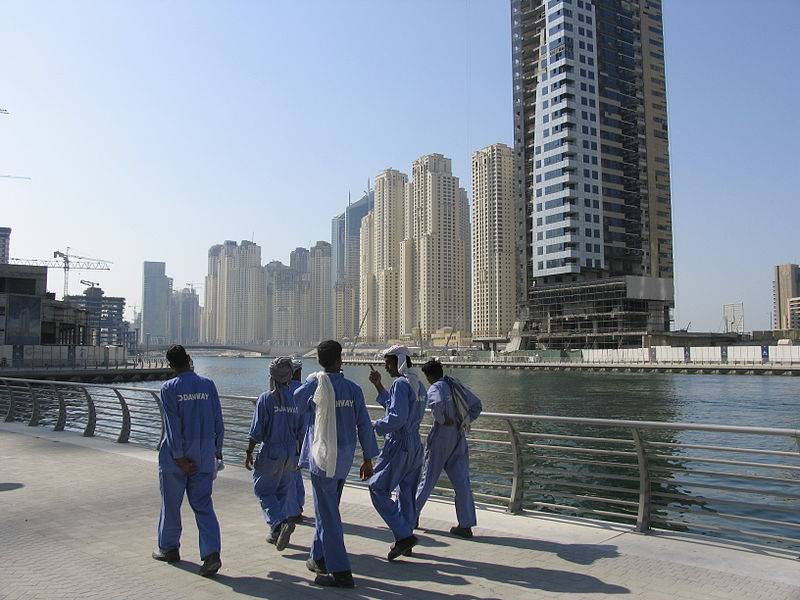Published in Political Insight
August 2011
Dubai demands hyperbole. It is the city with the world’s tallest tower, the world’s biggest shopping mall, the world’s largest per capita carbon footprint. To its admirers it stands as a beacon of pride and strength for the Arab world, a place that marries free trade and prosperity with Islamic values. To its detractors it embodies capitalism’s worst excesses, where the luxurious lifestyle of the rich depends upon the quasi-slavery of millions of migrant workers.
The plight of these migrants has received much media attention in recent years, especially after a damning Human Rights Watch report in 2006. The United Arab Emirates (UAE) continues to ban trade unions, and has been condemned for its system of indentured labour, under which migrants are legally bound to a single employer. Stories of passport confiscation, withheld wages and squalid living conditions have even appeared in the UAE press, despite the government’s strict control over media. Workers building the Burj Khalifa – the towering icon of Dubai’s ambition – on wages of just £2.84 a day, rioted in 2006, attracting international coverage.
During the economic downturn, migrant workers hit the news again as tens of thousands were shipped home following the crash of the construction industry, with many placed on ‘extended unpaid leave’ to avoid redundancy payments. Liberal western commentators gave ozymandian predictions of collapse: Simon Jenkins, writing in The Guardian, perhaps outdid them all with his visions of a future in which the towers of Dubai ‘will shed glass. Sand will drift round their trunkless legs … Gangs will seize the gated estates and random anarchy will rule the soulless boulevards’.
Yet despite the half-built skyscrapers and abandoned construction sites today, Dubai’s economy is rising again. And despite the widely publicised stories of labour abuses and degrading conditions, migrants continue to flock to the city, falling into the same patterns of debt and exploitation. They come mainly from India but also from Pakistan, Bangladesh, Sri Lanka, Nepal and the Philippines, doing everything from laying bricks to driving the wooden water taxis that shuttle across Dubai Creek. Working as gardeners, shop assistants, cleaners, drivers, cooks and housemaids, and labouring on construction sites in the 50°C desert heat, they continue to comprise over 80 per cent of the city’s population.
The labour camps in which they are housed – places like Al Quoz and Sonapur, a sprawling sub-city of 500,000 men, whose name in Hindi means ‘City of Gold’ – lie on the outskirts, far from the malls and luxury hotels, as well as the sensitive eyes of western expats. The surrounding desert is carpeted in rubbish, and regular sandstorms smother everything in choking yellow dust. Workers are crammed eight or ten to a room in barrack-like accommodation blocks, with poor sanitation and faulty air-conditioning. One man summed it up to me as: ‘we are living like sheep and goats’.
‘When I came here I was so excited’, said Guriqbal, a 20-year-old Punjabi working as a security guard. ‘I saw the clean streets and the big buildings, and I thought it was a beautiful city. But they drove me straight to this camp and now I am working 17 hours a day. They promised me 2,000 dirhams (£340) a month, but I only get 500 (£85). They fine me if I forget to shave, or go to work in a creased uniform. All my wages go on my debts. How can I send money home? I thought I would fulfil my dreams here, but my dreams have fallen apart.’
‘We signed a contract’, said Wija from Sri Lanka, ‘but we found the contract was different when we arrived. They gave me a different visa paper. My passport has been taken away. They are playing with us’.
The stories of the workers I met were variations on a theme, one I heard again and again in these bleak labour camps. Back home, unscrupulous recruitment agents promise lucrative jobs in the Gulf, charging anywhere from £1,000 to £3,000 for the visa processing fee. Most expect to pay off their loans after working for six months or so, and then begin sending money to their families. But on arrival in the UAE, they find that the jobs do not exist. Already deeply in debt to the agents, they have no option but to accept different positions, with lower rates of pay. Some are told to sign contracts written in Arabic, which they cannot understand. To further guarantee their compliance, the companies routinely confiscate their passports, charging exorbitant ‘processing fees’ if they want them back.
It’s essentially a three-way con, perpetrated between the recruitment agents, the companies and the UAE government. The agents exploit the migrant workers’ naivety to trick them into coming to Dubai, the companies exploit their powerlessness and lack of access to legal services, and the government – despite officially banning practices like passport confiscation – benefits from a limitless pool of cheap, expendable labour. Deprived of legal rights, trapped in debt and desperate to send money home, they have no choice but to stay and work, despite the demeaning conditions.
Even greater misery has been wrought by the economic crisis. In Satwa, a South Asian immigrant district, hundreds gather each morning by the roadside in the hope of being picked up for a day’s casual work. Their companies have not employed them for months, and the indentured labour system prevents them from finding other employers. Worse, many wages have been withheld since the global downturn hit; I was shown dozens of time sheets dating back six or seven months, which had yet to be paid.
On a rooftop within view of the glittering towers of the Financial Centre, I met a group of 20 Indian migrants sleeping rough under plastic sheets. Their washing was strung between satellite dishes, along with a few hopeful yellow hard hats, and they had built a crude brick stove to cook vegetables and rice. With no accommodation, jobs or passports, some had been stuck here for years, surviving only on charitable donations from an Indian businessman. These men were victims of the economic downturn and the UAE’s disregard for basic workers’ rights, but also, it seemed, of an astonishing lack of information back in their countries of origin. Surely older brothers and friends, having done their stints in Dubai, would have given some hint of the pitfalls that might await them?
On the other side of the Arabian Sea, I talked to Dr Irudaya Rajan, a migration expert at the Centre for Development Studies in Kerala, India. Kerala sends more migrants to the Gulf than anywhere else in the subcontinent; some towns and villages lose one man from every household. ‘Why do migrants keep on going? For prestige, not just money’, he said, explaining the powerful social and psychological factors at work. ‘There is huge social status attached to working in the UAE. Parents say “my son was in Dubai” – they do not know he was cleaning toilets there. The migrant often feels unable to tell his family of his position. When he comes home for a visit he dresses in a new suit, takes a taxi from the airport, spends his last rupees on jewellery, so everyone thinks he is rich. They never tell their real stories, because it is a humiliation. This is what perpetuates the dream.’
Along Kerala’s palm-fringed coast, a short drive from the capital Thiruvananthapuram, the lure of this dream is plain to see. Dilapidated fishing villages have incongruously sprouted modern villas, luridly painted in purple and pink, with tinted windows and new cars in their driveways. These houses, bought with UAE money before the Dubai bubble burst, stand as gleaming advertisements for the riches over the water.
As long as a visible minority return home richer than when they left, the majority of hopeful migrants will continue to flock to the ‘Dubai dream’. By the time they learn the economic reality of the labour trap behind it, it will be too late.


